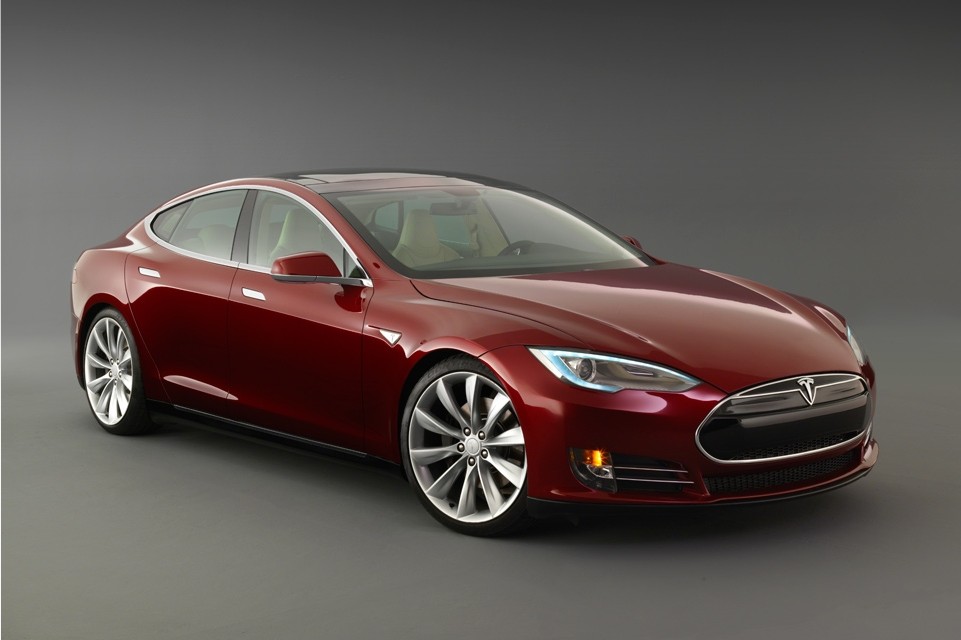And now we know: Tesla's Big Mystery Story, teased via more than one tweet from CEO Elon Musk, is this: You will soon be able to "lease" a brand-new 2013 Tesla Model S.
That's a good thing (though not nearly as much fun as some of the ideas proposed under the Twitter hashtag #TeslaPredictions). But we digress.
Tesla Motors [NSDQ:TSLA] has partnered with two banks, Wells Fargo and US Bank, to create a "new kind of financing product" that combines, the company claims, "the surety and comfort" of actually owning a car with the traditional advantages of a lease.
On a conference call held today shortly after the announcement, CEO Elon Musk said the new product would both make the Tesla Model S available to a much broader audience and address nervousness about the residual value of a battery-electric car with a battery pack whose capacity declines over time.
Here's how it will work, according to the company's press release:
- Buyers can put 10 percent of the purchase price down, and get financing from one of the two banks after their credit is approved.
- That 10-percent down payment is covered (or more) by U.S. Federal income-tax credits, state purchase rebates or credits of $2,500 to $7,500, and zero sales tax in two states and the District of Columbia.
- After a 3-year lease term, lessees may sell their Model S back to Tesla--at the residual value percentage of a Mercedes-Benz S Class, the company says, which is 43 percent of purchase price--but do not have to.
- Tesla CEO Elon Musk is personally standing behind that guaranteed resale value, thereby giving customers "absolute peace of mind" about the value of their car, "with all of the assets at my disposal".
According to Musk, this is effectively a five-year loan (he later clarified this to "a 66-month term") with the right to return the car after three years.
If Tesla buys the car back from the customer, Musk said, the company will pay at least the guaranteed value. If the market value is higher, Tesla will pay that amount.
The company suggests that with the guaranteed return value, the various Federal, state, and local incentives, and the lower cost-per-mile of driving on grid electricity, it will cost less than $500 per month to drive a new Tesla Model S.
Musk suggested that net cost of ownership would be "$500 or $600" a month, combining the lease payment and cost of electricity--and pointed interested customers toward a cost calculator on the company's website for the true net out-of-pocket cost for a Model S.
That calculator starts with a lease cost of $1,199 per month before the various incentives are applied. It includes cost savings both for the Business Tax Benefit (assuming that buyers drive their Tesla on business) and a value for time saved by not having to stop for gasoline.
Musk noted that current depositors will not be able to take advantage of the new lease product, essentially because it would mess up the company's accounting.
If drivers who finance the car decide not to return it after three years, they continue to make payments for two more years to pay it off.
The press release contained one line that raised eyebrows among several journalists: "Like the Model S, this product was created from the ground up to provide maximum benefit to consumers, rather than simply duplicating other financing programs that tend to favor companies at the expense of the individual."

2013 Tesla Model S
Tesla Motors has been on something of a roll lately, with an announcement that it had beaten its own mid-February projection and delivered "more than 4,750" electric cars from January through March.
That total actually meant that Tesla had the highest quarterly sales of all three previously top-selling plug-in electric cars in the U.S.: the Chevrolet Volt, Nissan Leaf, and Toyota Prius Plug-In Hybrid.
Musk also said on the call the company would be releasing news "every week or so" from here on out.
But whether this new method of financing your ability to drive a new Tesla will be the earth-shaking advance that Musk suggests is another question.
We'll leave that discussion to the financial analysts, industry professionals, and our readers.
Leave your thoughts in the Comments below.
+++++++++++













